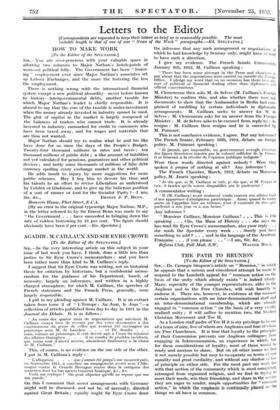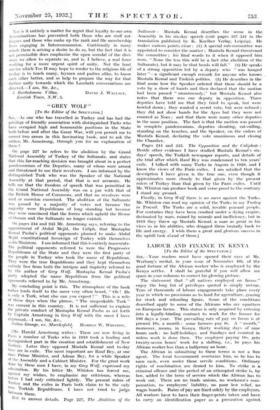THE PATH TO REUNION
[To the Editor of the SPECTATOR.] SIR,—Dr. Carnegie Simpson's article on "Reunion," in which he appeals that a serious and considered attempt be made to respond to the Lambeth appeal for "common action on the basis of the unity which already exists" is indeed timely. Many, especially of the younger representatives, alike in the Anglican and in the Free Churches, will wish heartily to endorse it. There are, however, in existence at the moment certain organizations with an inter-denominational staff and an inter-denominational membership, which are already engaged in "common action" on the basis of a very vividly realized unity ; it will suffice to mention two, the Student Christian Movement and Toe H.
As a London staff padre of Toe H it is my privilege to be one of a team of nine, five of whom are Anglicans and four of whom are Free Churchmen. It is true that loyalty to the principlm of their Communion prevents our Anglican colleagues from engaging in Intercommtmion, an experience in which, but for these considerations of loyalty, most of them would be ready and anxious to share. But on all other issues we find it not merely possible but easy to co-operate on terms of real equality and great cordiality, and without any shadow of loss of principle on either side. For the most part our work hes with that section of the community which is most completely estranged from organized religion, and we find in trying meet their needs, win their friendship, and share in the service they are eager to render, ample opportunities for " conmion action," in which the emphasis is continually placed on ti° things we all have in common. Nor is it entirely a matter for ;egret that loyalty to our own denominations has prevented both those who are staff col- leagues and those who make up the rank and file membership Iron' engaging in Intercomrnunion. Continually in many minds there is arising a desire to do so, but the fact that it is not permissible does emphasize the open scandal of the divi- sions we allow to separate us, and is, I believe, a real force working for a more Urgent spirit of unity. Not the least service which Toe H may hope to render to the religious life of to-day is to teach many, laymen and padres alike, to know each other better, and so help to prepare the way for that further unity towards which the Lambeth conversations arc directed.-1 am, Sir, &c.,







































 Previous page
Previous page